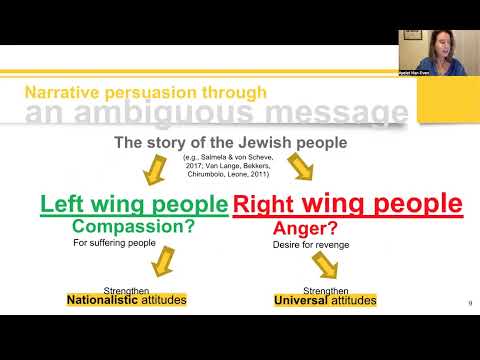 Speaker: Ayelet Har-Even
Speaker: Ayelet Har-Even
 Affiliation: University of Haifa
Affiliation: University of Haifa
Title: Narrative Persuasion Through Transportation into Songs and Affective Responses.
Abstract (long version below): Research demonstrates the persuasive effects of narratives. When people are transported into a narrative, it encourages them to align their attitudes with the narrative. Most of the studies use written narratives or movies. The current research demonstrates the persuasive effect of transportation into songs. The songs that we analyzed are commonly heard on Holocaust Memorial Day in Israel and tell the story of the Jewish people who suffered during World War II. We examined by online experiment how transportation into these songs changed nationalistic and universal attitudes among people of various political orientations. In addition, which emotions the transportation arouses.

 Long abstract
Long abstract
There are certain characteristics that make songs unique as a medium. For instance, songs are short, include a melody, and are often ambiguous. Moreover, people are repeatedly exposed to songs, potentially making them more persuasive. Repeated exposure characterizes songs related to commemorating historical events, such as Memorial Days.
The songs that we analyzed are commonly heard on Holocaust Memorial Day in Israel and tell the story of the Jewish people who suffered during World War II. These songs can stimulate nationalistic attitudes such as the importance of Israel as a shelter for the Jewish people, or universal attitudes such as preventing other people from suffering as the Jewish people had. We examined how transportation into these songs changed nationalistic and universal attitudes among people of various political orientations (Van Lange, Bekkers, Chirumbolo & Leone; 2011). In addition, we examined which emotions the transportation arouses since emotions could lead to persuasion (e.g., Mazzocco, Green, Sasota & Jones, 2010; Salmela & Scheve, 2017).
Method and Procedure
We conducted an online experiment (N =685). The participants were first asked to report on their mood and political attitudes. Then, they were randomly assigned to one of five experimental conditions, including hearing and reading the songs. The participants were then asked to answer a questionnaire that contained items measuring transportation, the emotions aroused by the song, and nationalist and universal attitudes.
Findings
We first examined how the political attitudes of the listeners influenced their emotional responses to the songs and whether they resulted in a change in their nationalist and universal attitudes. We found that political attitudes predicted feelings of anger in response to the songs such that right-wing participants felt more anger than left-wing participants (b = -0.22, SE = 0.12, p = .06). The response of anger also predicted nationalist attitudes (b = 0.14, SE = 0.05, p = .003).
Moreover, initial political attitudes indirectly led to nationalist attitudes through the mediation of the response of anger to the song (b = -0.03, SE = 0.02, p < .05, CI 95% [-0.08, -0.003]).
Compassion did not mediate the effect of initial political attitudes on nationalist attitudes p > .1.
Likewise, political attitudes predicted feelings of compassion in response to the songs such that left-wing participants felt more compassion than right-wing participants (b = 0.21, SE = 0.11, p = .06). In addition, the response of compassion predicted universal attitudes (b = 0.21, SE = 0.05, p < .0001). Moreover, initial political attitudes indirectly led to universal attitudes through the mediation of the response of compassion to the songs (b = 0.05, SE = 0.03, p < .05, CI 95% [0.006, 0.111]). Anger did not mediate the effect of initial political attitudes on universal attitudes p > .1
Then we examined the effect of transportation in the various political orientations. We found a significant indirect effect in the two extreme groups. In the extreme right-wing group, transportation significantly predicted nationalist attitudes through the mediation of the response of anger, (b = 0.03, SE = 0.02, p < .05, CI 95% [0.005, 0.086]). In the extreme left-wing group, transportation significantly predicted universal attitudes through the mediation of the response of compassion (b = 0.07 SE = 0.04, p < .05, CI 95% [0.004, 0.180]).
In the two moderate political groups, transportation enhanced the attitude that is less characteristic of their orientation: universal attitudes for the right-wing group (b = 0.21, SE = 0.08, p = .01, CI 95% [0.05, 0.379]) and nationalist attitudes for the left-wing group (b = 0.323, SE = 0.11, p = .004, CI 95% [0.104, 0.541]). Both of these effects were direct and were not mediated by the emotional responses. Moreover, hearing the songs, compared with reading the songs, indirectly led to national attitudes among left-wing people and universal attitudes among right-wing people, through the mediation of transportation.
Conclusions
left-wing people tended to react to the Holocaust songs with compassion, while right-wing people tended to respond with anger. Compassion, in turn, enhanced universal attitudes, while anger enhanced nationalist attitudes.
Transportation into the songs enhanced concordant attitudes for people who held extreme political attitudes. It enhanced nationalist attitudes for right-wing people through the mediation of anger, while it enhanced universal attitudes for left-wing people through the mediation of compassion. Most importantly, transportation into the songs resulted in more acceptance of discordant attitudes for those who expressed moderate political attitudes.

